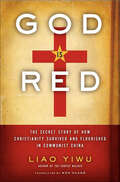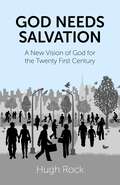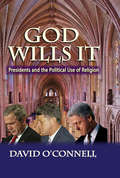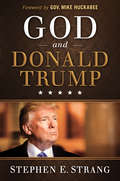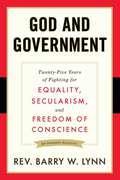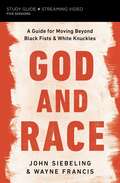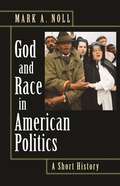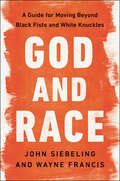- Table View
- List View
God Is Back
by John MicklethwaitTwo Economistwriters show how and why religion is booming around the world and reveal its vast effects on the global economy, politics, and more On the street and in the corridors of power, religion is surging worldwide. From Russia to Turkey to India, nations that swore off faith in the last century-or even tried to stamp it out-are now run by avowedly religious leaders. Formerly secular conflicts like the one in Palestine have taken on an overtly religious cast. God Is Backshines a bright light on this hidden world of faith, from exorcisms in São Paulo to religious skirmishing in Nigeria, to televangelism in California and house churches in China. Since the Enlightenment, intellectuals have assumed that modernization would kill religion-and that religious America is an oddity. As God Is Backargues, religion and modernity can thrive together, and America is becoming the norm. Many things helped spark the global revival of religion, including the failure of communism and the rise of globalism. But, above all, twenty-first century religion is being fueled by a very American emphasis on competition and a customer- driven approach to salvation. These qualities have characterized this country's faith ever since the Founders separated church and state, creating a religious free market defined by entrepreneurship, choice, and personal revelation. As market forces reshape the world, the tools and ideals of American evangelism are now spreading everywhere. The global rise of faith will have a dramatic and far- reaching impact on our century. Indeed, its destabilizing effects can already be seen far from Iraq or the World Trade Center. Religion plays a role in civil wars from Sri Lanka to Sudan. Along the tenth parallel, from West Africa to the Philippines, religious fervor and political unrest are reinforcing each other. God Is Backconcludes by showing how the same American ideas that created our unique religious style can be applied around the globe to channel the rising tide of faith away from volatility and violence.
God Is Red: The Secret Story of How Christianity Survived and Flourished in Communist China
by Liao Yiwu“A journalistic chronicle of how Christians survived the repressive Mao era as well as a glimpse into why their numbers are rising.” —The Christian Science MonitorA Books & Culture Best Book of the YearWhen journalist Liao Yiwu first stumbled upon a vibrant Christian community in officially atheistic China, he knew little about Christianity. In fact, he’d been taught that religion was evil, and that those who believed in it were deluded, cultists, or imperialist spies. But as a writer whose work had been banned in China and even landed him in jail, Liao felt a kinship with Chinese Christians in their unwavering commitment to freedom of expression and to finding meaning in a tumultuous society.In God is Red, this Chinese dissident and celebrated author of The Corpse Walker profiles the extraordinary lives of dozens of Chinese Christians—among them a nun, a surgeon, a minister, and a blind musician—providing a rare glimpse into the underground world of belief that is taking hold in the post-Mao era within the officially atheistic state of Communist China, a community that has inspired him deeply even though he is not a Christian himself. This is a fascinating tale of otherwise unknown personalities thriving against all odds.“Restores an important part of Chinese history that has been distorted, erased, or forgotten, and documents the life stories of a special group of people who battle against suppression to preserve their faiths.” —Liu Xiaobo, winner of the Nobel Peace Prize
God Land: A Story of Faith, Loss, and Renewal in Middle America
by Lyz Lenz“Will resonate with any readers interested in understanding American landscapes where white, evangelical Christianity dominates both politics and culture.” —Publishers WeeklyIn the wake of the 2016 election, Lyz Lenz watched as her country and her marriage were torn apart by the competing forces of faith and politics. A mother of two, a Christian, and a lifelong resident of middle America, Lenz was bewildered by the pain and loss around her—the empty churches and the broken hearts. What was happening to faith in the heartland?From drugstores in Sydney, Iowa, to skeet shooting in rural Illinois, to the mega churches of Minneapolis, Lenz set out to discover the changing forces of faith and tradition in God’s country. Part journalism, part memoir, God Land is a journey into the heart of a deeply divided America. Lenz visits places of worship across the heartland and speaks to the everyday people who often struggle to keep their churches afloat and to cope in a land of instability. Through a thoughtful interrogation of the effects of faith and religion on our lives, our relationships, and our country, God Land investigates whether our divides can ever be bridged and if America can ever come together.“God Land, Lyz Lenz’s much-anticipated debut book, is a marvel. Not only is it a window into the middle America so many like to stereotype but fail to fully understand in all of its complexity, but it mixes reportage, memoir, and gorgeous prose so seamlessly I wanted to know how she did it.” —Sarah Weinman, author of The Real Lolita
God Less America: Real Stories From the Front Lines of the Attack on Traditional Values
by Todd StarnesPay attention, people of faith. Dark clouds are gathering. The winds of intolerance are blowing. There’s a great storm approaching. American Christians are facing uncertain times. Our nation’s values are under assault. Religious liberty has been undermined. We live in a day when right is now wrong and wrong is now right. The vicious leftwing attack against the recent traditional marriage stance of Chick-fil-A should serve as a wakeup call to people of faith. It’s not about a chicken sandwich. It’s about religious liberty. It’s about free speech. It’s about the future of our nation. As a reporter covering the culture war for FOX News, Todd Starnes is on the front lines of these attacks against traditional values. In God Less America, he uses both recent news stories and compelling interviews with today’s top conservative leaders to bring to light what is happening across our country. In his award-winning, satire-meets-serious writing style, he strikes an important blow in today’s culture wars.
God Made Me Do It
by Marc HartzmanDoes God, in His infinite wisdom, convince people to get rid of their car insurance? Does He encourage cannibalism? Does the God of more than six billion people actually have time to root for the Minnesota Vikings?According to some, yes. How do they know? God told them. Luckily, God also told Marc Hartzman to write this book, a collection of the most shocking, absurd, and hilarious things people have ever claimed God asked them to do, and to present them for your pure reading enjoyment. Including:The man that God told to perform surgery on himselfGod's generous offer to miraculously fill his believer's gas tankThe fateful day God (assumedly feeling nostalgic for his teen years) asked a man to TP a police stationThe woman God instructed to direct traffic-toplessAnd, sadly, many more
God Needs Salvation: A New Vision of God for the Twenty First Century
by Hugh RockMany people today have deserted the old forms of religion. But does this make them any the less religious? Hugh Rock&’s message is that people are inherently religious. The necessary task today is to articulate anew the reality of religion. In a wide-ranging survey, that draws together the past fifty years of liberal theology and sociological discussion about the interface of religion and popular culture, he concludes that it is in our new respect for the autonomous self-fulfilment of the potential of every person&’s life that can be found the message transferred out of the New Testament.
God Particle: The Super-Collision of Science, Religion and Terror (Quarterback Operations #3)
by Tom AvitabileWhen the smallest imagined particle of matter threatens to destroy all that matters, science and religion collide on the world stage and within the corridors of power. Presidential Science Advisor William &“Wild Bill&” Hiccock and his top-secret Quarterback Operations Group (QUOG) has already faced down some of the most sinister high-tech rivals imaginable. Now they must face one that can eliminate all life on Earth in an instant.THE GOD PARTICLE is a super-kinetic thriller that pits brains, religion, political power, and common humanity against the onslaught of extremely dangerous, narrowly focused scientific exploration into the fabric of creation, complete with a plot to shoot down one of the President's helicopters. Fringe religious groups – but not the usual suspects – engage in terror. Ugly espionage is set against the beauty of the Cote D'Azur. The romance of Paris offsets the grit of Boston's South of Roxbury while the Euro-pop discos of Switzerland punctuate the quest.In the end it comes down to one question: Can former FBI agent Brooke Burrell, now QUOG's lead operative, choose between her personal and professional life in time to solve the puzzle and stop it all?
God Save Texas: A Journey into the Soul of the Lone Star State
by Lawrence Wright<P>With humor and the biting insight of a native, the Pulitzer Prize-winning author of The Looming Tower explores the history, culture, and politics of Texas, while holding the stereotypes up for rigorous scrutiny. <P>God Save Texas is a journey through the most controversial state in America. It is a red state in the heart of Trumpland that hasn't elected a Democrat to a statewide office in more than twenty years; but it is also a state in which minorities already form a majority (including the largest number of Muslims). The cities are blue and among the most diverse in the nation. <P>Oil is still king but Texas now leads California in technology exports. The Texas economic model of low taxes and minimal regulation has produced extraordinary growth but also striking income disparities. <P>Texas looks a lot like the America that Donald Trump wants to create. And Wright's profound portrait of the state not only reflects our country back as it is, but as it was and as it might be. <P><b>A New York Times Bestseller</b>
God Save the Queen
by Summersdale PublishersShe’s the most well-known woman on the planet, but did you know that the Queen was the first monarch to circumnavigate the globe? Or that she collected clothing coupons to get the material for her wedding dress? Here’s a book packed with fascinating facts to celebrate our wonderful Queen.
God Save the Queen
by Summersdale PublishersShe’s the most well-known woman on the planet, but did you know that the Queen was the first monarch to circumnavigate the globe? Or that she collected clothing coupons to get the material for her wedding dress? Here’s a book packed with fascinating facts to celebrate our wonderful Queen.
God Wills it: Presidents and the Political Use of Religion
by David O'ConnellGod Wills It is a comprehensive study of presidential religious rhetoric. Using careful analysis of hundreds of transcripts, David O'Connell reveals the hidden strategy behind presidential religious speech. He asks when and why religious language is used, and when it is, whether such language is influential.Case studies explore the religious arguments presidents have made to defend their decisions on issues like defense spending, environmental protection, and presidential scandals. O'Connell provides strong evidence that when religious rhetoric is used public opinion typically goes against the president, the media reacts harshly to his words, and Congress fails to do as he wants. An experimental chapter casts even further doubt on the persuasiveness of religious rhetoric.God Wills It shows that presidents do not talk this way because they want to. Presidents like Jimmy Carter and George H.W. Bush were quite uncomfortable using faith to promote their agendas. They did so because they felt they must. God Wills It shows that even if presidents attempt to call on the deity, the more important question remains: Will God come when they do?
God and Cancel Culture: Stand Strong Before It's Too Late
by Stephen E. StrangFROM THE BEST-SELLING AUTHOR OF GOD AND DONALD TRUMP64% of Americans believe cancel culture is a threat to their freedom. This book will help you realize the seriousness of the battle before us and illuminate the present circumstance for the purpose of doing good-to bring hope. It will document what is happening in our country, how believers can respond, and why we can look expectantly to the future. This is the time for neither religious fatalism nor political inaction. No matter how bad things get in the culture or in government, the Bible is true and God has plans and purposes we don't understand-and in the end we win. Things are chaotic in America. Liberal policies are advancing. A rash of executive orders appears to be moving the nation closer to socialism and a one-world government. And conservatives, including many Christians, are being censored as never before. There's even a term-cancel culture-which 64 percent of Americans believe poses a threat to their freedom, according to a Harvard CAPS-Harris Poll. (Among Republicans, that figure is even higher at 80 percent.) The term applies to all conservatives who oppose the politically correct crowd, but it's part of a bigger effort to cancel Christianity and those who espouse biblical principles. It almost seems this is the beginning of the end and the Antichrist will appear at any time. You pick the cultural or political issue, and there likely is not even the semblance of widespread agreement. It seems that Christians are in an unprecedented season of fragmentation, potential division, and actual separation on many fronts. Instead of going forward, much of the church seems to be moving backward or standing still, waiting for what's next. The body of Christ is a big, diverse family, and we must choose to cheer one another on rather than get into circular firing squads. We are called to advance on every front. This book will assess and affirm the different approaches playing out. The body needs clarity and unity- and has little of both right now. Wounded armies want hope, focus, and encouragement. This book will not throw anyone overboard who is standing for the truth in some positive way. Rather, it will allow readers to look critically at the various approaches vying for our allegiance and attention here in the middle of 2021. In the course of this survey, we will find reason to affirm where people are fighting on the battlefield and validate the perspectives they bring. Featuring interviews with a cross section of leaders, this book will document what is happening in our country, how believers can respond, and why we can look to the future with hope. Even though things are bad, we must understand that conditions have been this bad or worse in the past and God always came through. He has plans and purposes we don't understand. Christians must not lose heart. We must stand strong and not be intimidated. We must pray, and we must believe God for a great awakening. No matter how bad things get in the culture or in government, the Bible is true and "all things work together for good to those who love God" (Rom. 8:28, MEV). That's because we are called according to His purpose. A purpose never goes in reverse. This book will reveal what that looks like in its various forms in the day in which we live. It gives a great handle for promoting unity and appreciation of one another when that is breaking down so badly elsewhere. Indeed, maybe the love Jesus spoke about that makes us recognizable to the world will be seen as this book illuminates the supernatural unity among people of very diverse opinions and approaches while pointedly addressing these various hot-button areas.
God and Donald Trump
by Stephen E. StrangOver 100 5- Star Reviews! Featured on CNN, Fox News, and MSNBC"One way to get President Donald Trump to stop and talk at the World Economic Forum: wield a book about him. On his way into the World Economic Forum, Trump stopped and talked for about ten seconds to one delegate who was brandishing a copy of &“God and Donald Trump&” by Stephen E. Strang. He then proceeded to hold the book aloft in his left hand." - Associated PressWith pundits asking, &“How did he win?&” this book explores whether there was a supernatural element involved. Christian leaders prophesied before the election that God had raised up Donald Trump to lead the nation through a time of crisis. But could this billionaire reality-TV star actually convince the voters he was for real? If so, what is God doing now not only in Donald&’s Trump&’s life, but also in the nation? Trump is an enigma, a brash self-promoter, casino owner, and man of the world. Yet he is also a devoted husband and father who has surrounded himself with men and women of faith and has made religion a key component of his image.God and Donald Trump is a powerful first-person account of one of the most contentious elections in American history, with exclusive interviews and insightful commentary from the men and women who were there.
God and Empire
by John Dominic CrossanAt the heart of the Bible is a moral and ethical call to fight unjust superpowers, whether they are Babylon, Rome, or even America. From the divine punishment and promise found in Genesis through the revolutionary messages of Jesus and Paul, John Dominic Crossan reveals what the Bible has to say about land and economy, violence and retribution, justice and peace, and, ultimately, redemption. In contrast to the oppressive Roman military occupation of the first century, he examines the meaning of the non-violent Kingdom of God prophesized by Jesus and the equality advocated by Paul to the early Christian churches. Crossan contrasts these messages of peace with the misinterpreted apocalyptic vision from the Book of Revelation, which has been misrepresented by modern right-wing theologians and televangelists to justify U.S. military actions in the Middle East. In God and Empire Crossan surveys the Bible from Genesis to Apocalypse, or the Book of Revelation, and discovers a hopeful message that cannot be ignored in these turbulent times. The first-century Pax Romana, Crossan points out, was in fact a "peace" won through violent military action. Jesus preached a different kind of peace--a peace that surpasses all understanding--and a kingdom not of Caesar but of God. The Romans executed Jesus because he preached this Kingdom of God, a kingdom based on peace and justice, over the empire of Rome, which ruled by violence and force. For Jesus and Paul, Crossan explains, peace cannot be won the Roman way, through military victory, but only through justice and fair and equal treatment of all people.
God and Gold: Britain, America, and the Making of the Modern World
by Walter Russell MeadA stunningly insightful account of the global political and economic system, sustained first by Britain and now by America, that has created the modern world. The key to the two countries' predominance, Mead argues, lies in the individualistic ideology inherent in the Anglo-American religion. Over the years Britain and America's liberal democratic system has been repeatedly challeged—by Catholic Spain and Louis XIV, the Nazis, communists, and Al Qaeda—and for the most part, it has prevailed. But the current conflicts in the Middle East threaten to change that record unless we foster a deeper understanding of the conflicts between the liberal world system and its foes.
God and Government: Twenty-Five Years of Fighting for Equality, Secularism, and Freedom Of Conscience
by Barry W. LynnA central player in every major church-state-separation battle for decades, the Rev. Barry W. Lynn understands the complexities of this divisive issue like few others. As a long-time activist, a civil rights lawyer, and an ordained minister in the United Church of Christ, he offers a unique perspective and a wealth of experience on church-state controversies. In this lively book, he has compiled his writings from various sources to explore in depth the many ways religious extremists have attempted to erode individual liberties. The topics range from publicly-promoted prayer to efforts to undermine public education and replace it with taxpayer-subsidized vouchers for religious schools, interfering with end-of-life and reproductive rights, censorship, and belligerence directed against nonbelievers and minorities. Lynn concludes that the ultimate goal of these extremist forces-consisting mainly of the Protestant Religious Right and the Roman Catholic hierarchy-is the creation of a corporate theocracy, a decidedly undemocratic system of government in which nonconservative Christians, along with humanist, feminists, and the LGBTQ community, are relegated to second-class status in America.
God and Guns in America
by Michael W. AustinWhat if Christians did more than offer thoughts and prayers in response to gun violence? Ethicist Michael Austin argues—from a biblical but nonpacifist perspective—that we can impose firearms restrictions to make our society safer and less fearful while still respecting the rights of gun owners. God and Guns in America is a thoughtful, measured, and articulate treatment of a polarizing topic that is too often treated with more heat than light.
God and Guns in America
by Michael W. AustinWhat if Christians did more than offer thoughts and prayers in response to gun violence? Ethicist Michael Austin argues—from a biblical but nonpacifist perspective—that we can impose firearms restrictions to make our society safer and less fearful while still respecting the rights of gun owners. God and Guns in America is a thoughtful, measured, and articulate treatment of a polarizing topic that is too often treated with more heat than light.
God and Hillary Clinton: A Spiritual Life
by Paul KengorFor nearly three decades political observers have sought to understand the complex relationship between Hillary Clinton's faith and her politics. Now, in this first spiritual biography of the former first lady, acclaimed historian Paul Kengor sets out to answer the elusive question: What does Hillary Clinton believe? Based on exhaustive research, God and Hillary Clinton tells the surprising story of Hillary's spiritual evolution, detailing the interaction between her lifelong religious beliefs and her personal history that has made her the politician she is today. Offering an in-depth spiritual chronology of Clinton's life, author Paul Kengor also analyzes the fraught relationship between her faith and her secular policies--most notably how she reconciles her pro-choice stance on abortion with her Christian beliefs--and scrutinizes how these policies have changed over the course of her political career. What emerges is an unexpected portrait of a political figure whose ideals have been shaped by both the power of her politics and the depth of her religious devotion.
God and Man at Yale: The Superstitions of 'Academic Freedom'
by William F. Buckley Jr."For God, for country, and for Yale... in that order," William F. Buckley Jr. wrote as the dedication of his monumental work—a compendium of knowledge that still resonates within the halls of the Ivy League university that tried to cover up its political and religious bias. In 1951, a twenty-five-year-old Yale graduate published his first book, which exposed the "extraordinarily irresponsible educational attitude" that prevailed at his alma mater. The book, God and Man at Yale, rocked the academic world and catapulted its young author, William F. Buckley Jr. into the public spotlight. Now, half a century later, read the extraordinary work that began the modern conservative movement. Buckley's harsh assessment of his alma mater divulged the reality behind the institution's wholly secular education, even within the religion department and divinity school. Unabashed, one former Yale student details the importance of Christianity and heralds the modern conservative movement in his preeminent tell-all, God and Man at Yale: The Superstitions of "Academic Freedom."
God and Race Bible Study Guide plus Streaming Video: A Guide for Moving Beyond Black Fists and White Knuckles
by John Siebeling Wayne FrancisHow you—and your church community—can play a part in ending racism. Pastors John Siebeling and Wayne Francis—whose thriving congregations are the embodiment of diversity—have pooled their insights and experiences to help others have conversations about racism. Many churches and leaders have sought their counsel, hoping to emulate their success, and yours can too.This study guide has everything you need for a full Bible study experience, including:The study guide itself—with discussion and reflection questions, video notes, and a leader's guide.An individual access code to stream all five video sessions online (you don't need to buy a DVD!).God and Race provides a non-threatening means for pastors, church leaders, and churchgoers to speak to each other about this difficult and pervasive problem. In this study, Wayne and John show how neither black fists nor white knuckles are the answer to the problem, but that what is needed are open hands, open hearts, and open minds. Together, they:Examine the White-Black tension from both perspectives.Answer all the uncomfortable questions we're afraid to ask—regarding ourselves, our families, our work and relationships, and the church.Discuss seven key statements that they believe the church needs to acknowledge today—including that racism is a real problem, that it's more than just a spiritual issue, and that the Gospel is the solution.Provide practical steps anyone can take to become part of the solution.In the Gospels, we see how the crowds came to Jesus because he talked about real issues and was not afraid to engage in the important issues of his day. In the church of today, we need to be doing the same: only by recognizing, addressing, and openly dialoguing about the racial tension in America can we begin to work toward real solutions together.Streaming video access code included. Access code subject to expiration after 12/31/2027. Code may be redeemed only by the recipient of this package. Code may not be transferred or sold separately from this package. Internet connection required. Void where prohibited, taxed, or restricted by law. Additional offer details inside.
God and Race in American Politics: A Short History
by Mark A. NollReligion has been a powerful political force throughout American history. When race enters the mix the results have been some of our greatest triumphs as a nation--and some of our most shameful failures. In this important book, Mark Noll, one of the most influential historians of American religion writing today, traces the explosive political effects of the religious intermingling with race. Noll demonstrates how supporters and opponents of slavery and segregation drew equally on the Bible to justify the morality of their positions. He shows how a common evangelical heritage supported Jim Crow discrimination and contributed powerfully to the black theology of liberation preached by Martin Luther King Jr. In probing such connections, Noll takes readers from the 1830 slave revolt of Nat Turner through Reconstruction and the long Jim Crow era, from the civil rights movement of the 1950s and 1960s to "values" voting in recent presidential elections. He argues that the greatest transformations in American political history, from the Civil War through the civil rights revolution and beyond, constitute an interconnected narrative in which opposing appeals to Biblical truth gave rise to often-contradictory religious and moral complexities. And he shows how this heritage remains alive today in controversies surrounding stem-cell research and abortion as well as civil rights reform. God and Race in American Politics is a panoramic history that reveals the profound role of religion in American political history and in American discourse on race and social justice.
God and Race: A Guide for Moving Beyond Black Fists and White Knuckles
by John Siebeling Wayne FrancisA White pastor and a Black pastor, close friends who have each built racially diverse congregations, offer a model Christians can follow to open necessary conversations about race, encourage unity, and foster mutual respect to heal a wounded nation riven by racial tension and political tribalism.For years, Pastors John Siebeling and Wayne Francis have led thriving congregations that are the embodiment of diversity; Siebeling in Memphis and Francis in New York City. Many churches and leaders have sought their counsel, hoping to emulate their success. At the height of the Black Lives Matter protests in Summer 2020, they pooled their insights and experiences to help others facilitate conversations about racism. The guide they developed is the basis of God and Race. Siebeling and Francis examine the White-Black tension from both perspectives and answer all the uncomfortable questions we’re afraid to ask—regarding ourselves, our families, our work and relationships, and the church. Most important, they provide practical steps anyone can take to become part of the solution. Whether you are a church leader or just a caring person who wants to make a difference, God and Race provides inspiration and guidance to help you become an agent of reconciliation and change. These two wise pastors teach you how to find your voice and join Jesus in healing, to help bring our divided communities together with open minds, open hearts, and open hands.Many Christian books on race either do not ask the hard questions or, if they do, speak as critics outside the mainstream church. Siebeling and Francis probe the meaning of racial reconciliation and reveal how the church can be a positive and effective leader to move us forward, beyond hate and injustice, to equality and love.
God and Ronald Reagan: A Spiritual Life
by Paul KengorIn this groundbreaking book, political historian Paul Kengor draws upon Reagan's legacy of speeches and correspondence, and the memories of those who knew him well, to reveal a man whose Christian faith remained deep and consistent throughout his more than six decades in public life.
God and Ronald Reagan: A Spiritual Life
by Paul KengorRonald Reagan is hailed today for a presidency that restored optimism to America, engendered years of economic prosperity, and helped bring about the fall of the Soviet Union. Yet until now little attention has been paid to the role Reagan's personal spirituality played in his political career, shaping his ideas, bolstering his resolve, and ultimately compelling him to confront the brutal -- and, not coincidentally, atheistic -- Soviet empire.In this groundbreaking book, political historian Paul Kengor draws upon Reagan's legacy of speeches and correspondence, and the memories of those who knew him well, to reveal a man whose Christian faith remained deep and consistent throughout his more than six decades in public life. Raised in the Disciples of Christ Church by a devout mother with a passionate missionary streak, Reagan embraced the church after reading a Christian novel at the age of eleven. A devoted Sunday-school teacher, he absorbed the church's model of "practical Christianity" and strived to achieve it in every stage of his life.But it was in his lifelong battle against communism -- first in Hollywood, then on the political stage -- that Reagan's Christian beliefs had their most profound effect. Appalled by the religious repression and state-mandated atheism of Bolshevik Marxism, Reagan felt called by a sense of personal mission to confront the USSR. Inspired by influences as diverse as C.S. Lewis, Whittaker Chambers, and Aleksandr Solzhenitsyn, he waged an openly spiritual campaign against communism, insisting that religious freedom was the bedrock of personal liberty. "The source of our strength in the quest for human freedom is not material, but spiritual," he said in his Evil Empire address. "And because it knows no limitation, it must terrify and ultimately triumph over those who would enslave their fellow man."From a church classroom in 1920s Dixon, Illinois, to his triumphant mission to Moscow in 1988, Ronald Reagan was both political leader and spiritual crusader. God and Ronald Reagan deepens immeasurably our understanding of how these twin missions shaped his presidency -- and changed the world.

